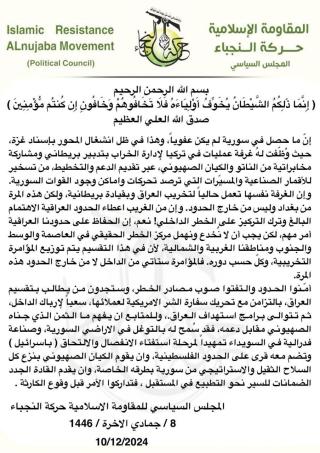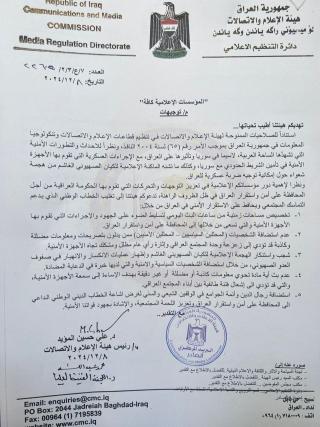The CMC’s latest restriction of Iraqi press freedoms is a manifestation of fear among Iran-backed militias that they could also be ousted from power.
After members of the so-called ‘axis of resistance’ were expelled from Syria, Iraq’s self-styled muqawama (resistance) militias have grown increasingly paranoid about the potential for an uprising that could threaten their hold on power in Iraq. Harakat al-Nujaba (HaN), one of the most aggressive Iran-backed militias, has been vocal in accusing foreign powers of conspiring to destabilize the country. On December 10, HaN’s political bureau released a statement alleging an Anglo-American plot to bring chaos to Iraq.
Projecting paranoia over domestic security
The statement criticizes Iraqi Security Forces (ISF) for prioritizing border security following the fall of the Assad regime in Syria. It claims: “What happened in Syria was not spontaneous. It occurred during the axis’s preoccupation with supporting Gaza. An operations room based in Turkey orchestrated the destruction, with British planning and intelligence contributions from NATO and the Zionist entity. This included providing support, planning, and the use of satellites and drones to monitor Syrian forces’ movements and positions.”
HaN warns in the statement that the same forces are now allegedly targeting Iraq, concluding:
“The same operations room is currently working to sabotage Iraq under British leadership, but this time from Baghdad, not from outside the borders.”
Using an accusatory tone towards the ISF, the statement critiques the Iraqi government’s focus on border security while, in their view, neglecting internal threats. The HaN statement argues: “It is strange to give the Iraqi borders such great attention while ignoring the internal danger! Yes, preserving our borders is important, but we must not be deceived and overlook the real threat centered in the capital. The conspiracy is distributed across the center, south, and our western and northern regions, each playing their role in the plan. The true danger comes from within, not outside the borders” (Figure 1).
Media crackdown
This statement highlights the intense paranoia currently gripping Iraqi muqawama groups, as they perceive both external and internal threats to their position. To counter these alleged conspiracies, muqawama figures are increasingly calling for restrictions on media space. Their rationale is that curbing freedom of speech in the country would help prevent these conspiracies from materializing. The militia-dominated Communications and Media Commission (CMC) swiftly acted in solidarity with the militias, moving to implement measures aligned with their demands.
CMC issued “directives” to “all media organizations” described as measures to counter “the media machine of the usurping Zionist entity is waging a fierce attack, threatening the possibility of launching a military strike against Iraq.”
The letter which is signed by Ali Hussein al-Moayad, the CMC director-general, included the following directives (which are quoted verbatim):
- To allocate time slots from daily broadcast hours to highlight the efforts and measures undertaken by the security forces, through which they seek to maintain the security and stability of Iraq.
- To not host figures (political and security analysts) who make misleading and false statements and information that may lead to destabilizing Iraqi society and arousing misleading public opinion that is skeptical of the security services.
- To condemn and denounce the media onslaught of the usurping Zionist entity and to show the defeat and collapse in the ranks of the Zionist enemy, by hosting political and security figures who have experience in counterpropaganda.
- Not to broadcast any material containing false, misleading or inaccurate information with the aim of harming the reputation of the security services, which may lead to igniting sectarian strife among members of Iraqi society.
- To host clerics and imams of mosques affiliated with the Shia and Sunni endowments for the purpose of spreading the national religious discourse calling for preserving the security and stability of Iraq, strengthening societal cohesion, and praising the efforts of our security forces (figure 2).
The actions and rhetoric of Iraqi muqawama militias project a deepening sense of insecurity and paranoia, as they perceive threats to their influence—and even survival—both externally and internally. This kind of threat inflation can also justify a greater role and budget for the Popular Mobilization Forces and greater restrictions on public rights. The militia push to curtail media freedoms, supported by directives from the militia-controlled Communications and Media Commission, highlights their strategy to dominate the narrative under the pretext of safeguarding national security and stability. This reflects their efforts to pre-empt any movement resembling the Tishreen protests, which called for comprehensive reforms to the political system and advocated for a national agenda over one that turns Iraq into a satellite state of Iran.

































